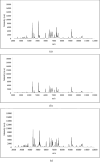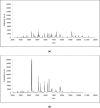Exploring the diversity of produced water bacteria with hydrocarbon-degrading potential using MALDI-TOF MS and multivariate statistical analyses
- PMID: 41003703
- PMCID: PMC12474702
- DOI: 10.1007/s10529-025-03641-0
Exploring the diversity of produced water bacteria with hydrocarbon-degrading potential using MALDI-TOF MS and multivariate statistical analyses
Abstract
The success of bioremediation of produced water relies on the use of hydrocarbon-degrading bacteria. Hence, the selection of highly tolerant endogenous strains from produced water is crucial to designing successful bioremediation. However, the employed isolation and screening approaches are, in general, long. Integrative and rapid approaches based on microbiological and molecular techniques are now required due to the frequent fluctuation of the composition of the produced water. Here, enrichment cultures at high toxicity followed by protein profiling using MALDI-TOF MS were shown to be efficient in clustering the endogenous hydrocarbon-degrading bacteria and help select the potential candidates. Several bacterial strains (n = 18) were isolated from produced water sampled from Qatar's North Field natural gas production. Fourteen strains were identified as Bacillus cereus (n = 14), and one as Staphylococcus hominis (n = 1) using MALDI-TOF MS. Three strains were identified as Aneurinibacillus humi (n = 2) and Aneurinibacillus aneurinilyticus (n = 1) through ribotyping. The strains were further differentiated based on their protein profiles using MALDI-TOF MS and multivariate statistical analyses. Multivariate analyses (composite correlation index, principal component analysis, and dendrogram) demonstrated substantial diversity among the isolates, highlighting their potential as robust candidates for bioremediation and produced water treatment.
Keywords: Bacterial diversity; Enrichment cultures; Hydrocarbon-degrading bacteria; MALDI-TOF MS; Produced water.
© 2025. The Author(s).
Conflict of interest statement
Declarations. Conflict of interests: The authors declare no conflict of interest.
Figures







References
-
- Al Disi Z, Jaoua S, Al-Thani D, Al-Meer S, Zouari N (2017) Considering the specific impact of harsh conditions and oil weathering on diversity, adaptation, and activity of hydrocarbon-degrading bacteria in strategies of bioremediation of harsh oily-polluted soils. Biomed Res Int 2017:8649350. 10.1155/2017/8649350 - PMC - PubMed
-
- Al Kaabi N, Al-Ghouti MA, Jaoua S, Zouari N (2020) Potential for native hydrocarbon-degrading bacteria to remediate highly weathered oil-polluted soils in Qatar through self-purification and bioaugmentation in biopiles. Biotechnol Rep 28:e00543. 10.1016/j.btre.2020.e00543
-
- Al Kaabi N, Al Disi Z, Al-Ghouti M, Solling TI, Zouari N (2022) Interaction between indigenous hydrocarbon-degrading bacteria in reconstituted mixtures for remediation of weathered oil in soil. Biotechnol Rep 39:e00767. 10.1016/j.btre.2022.e00767
-
- Al Marri S, Eldos HI, Ashfaq MY, Saeed S, Skariah S, Varghese L, Mohamoud YA, Sultan AA, Raja MM (2023) Isolation, identification, and screening of biosurfactant-producing and hydrocarbon-degrading bacteria from oil and gas industrial waste. Biotechnol Rep 39:e00804. 10.1016/j.btre.2023.e00804
-
- Al Sayegh SY, Al Disi ZA, Al-Ghouti MA, Zouari N (2021) Evaluation by MALDI-ToF MS and PCA of the diversity of biosurfactants and their producing bacteria, as adaptation to weathered oil components. Biotechnol Rep 31:e00660. 10.1016/j.btre.2021.e00660
MeSH terms
Substances
LinkOut - more resources
Full Text Sources

